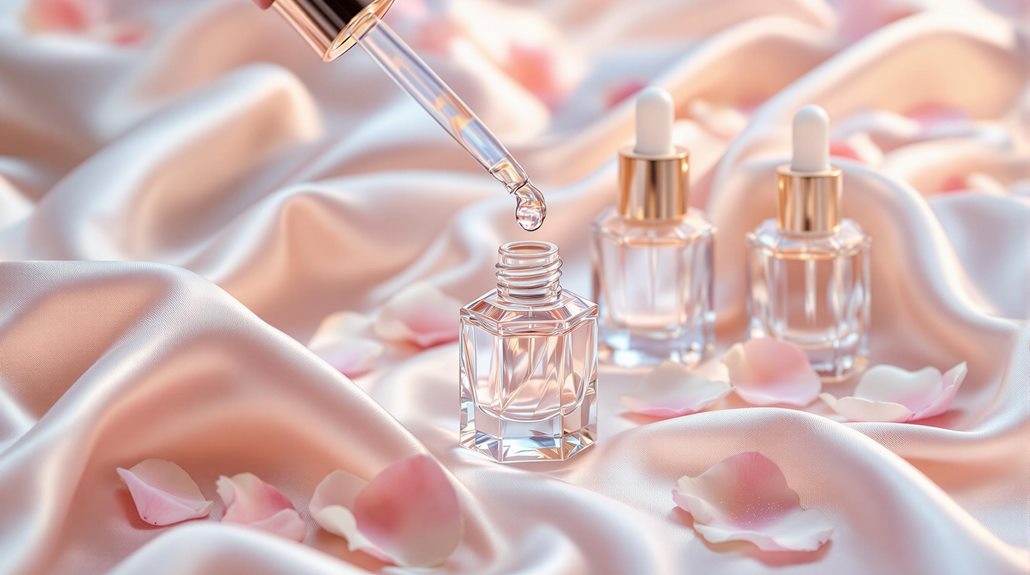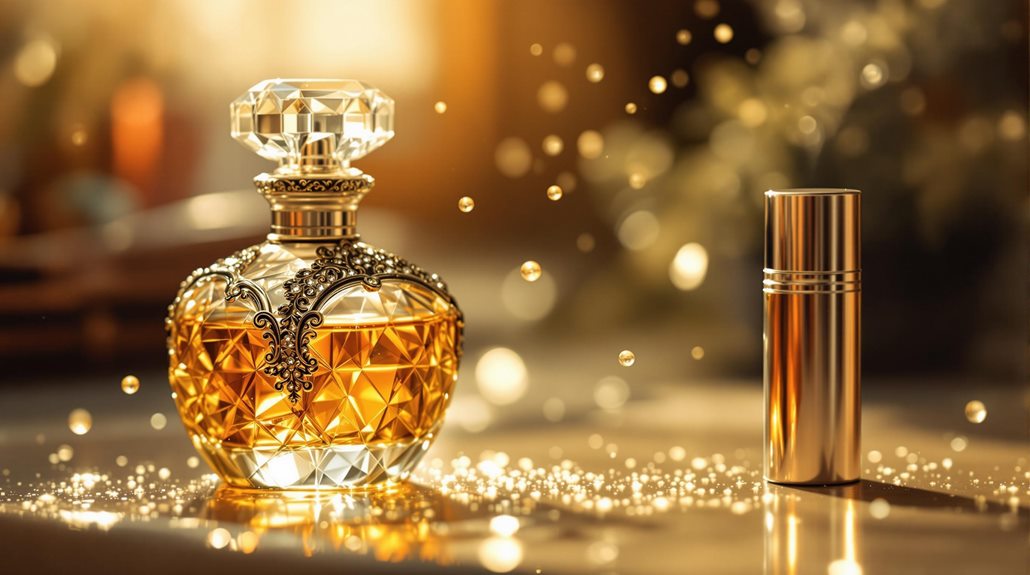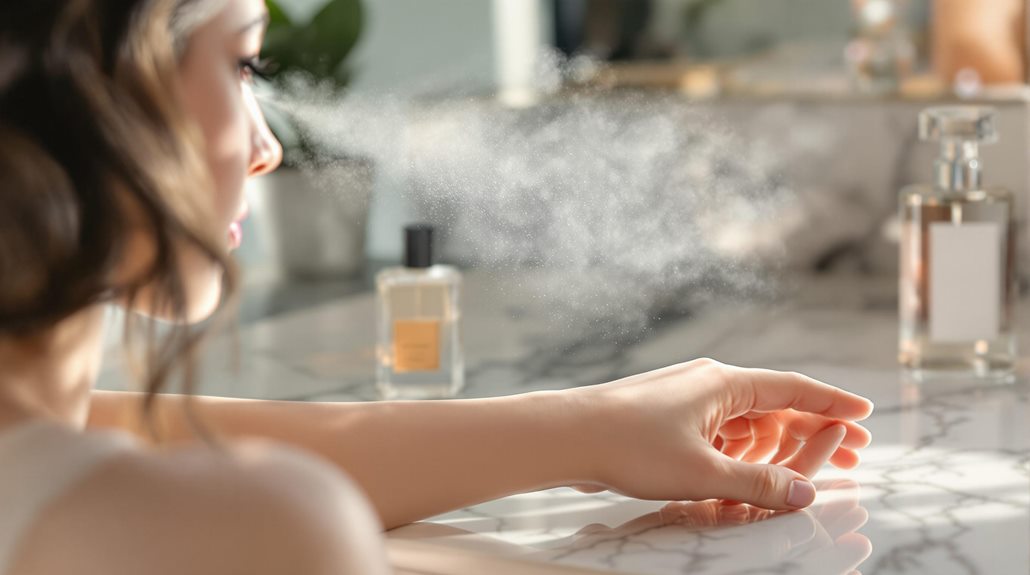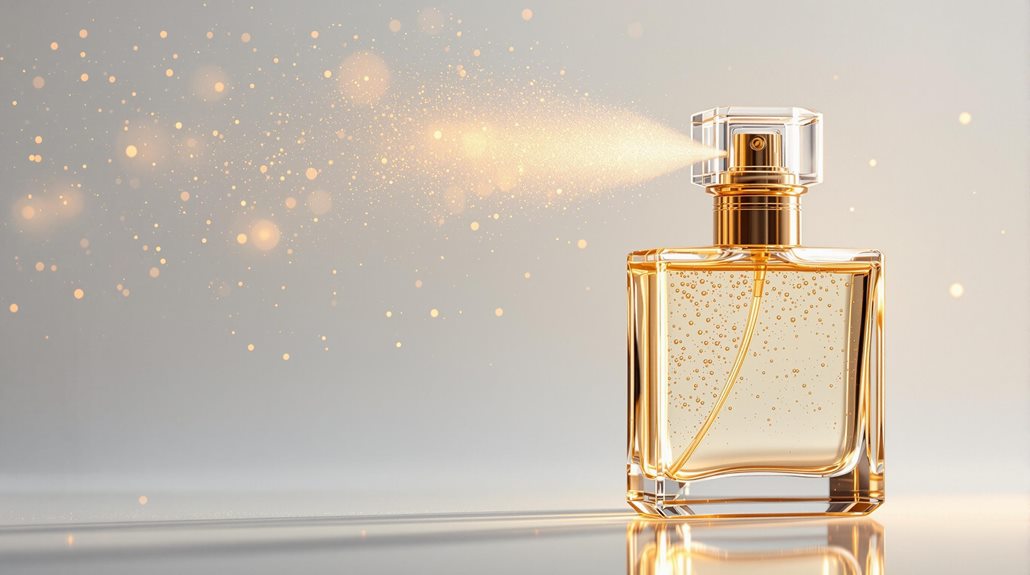Say Goodbye to Lingering Scents: How to Get Rid of Perfume Smell

To eliminate unwanted perfume smell, you'll need to break down the fragrance molecules using effective removal methods. Start with natural oils like almond or jojoba, massaging them into your skin to lift away the scent. For clothes, soak them in warm water with white vinegar, or pre-treat with a baking soda paste before washing. Hair can be deodorized using clarifying shampoo or a vinegar rinse. For quick fixes, try rubbing alcohol on a cotton pad or antibacterial hand gel to neutralize the fragrance. These basic techniques are just the beginning of your expedition to scent-free success.
Understanding Perfume Composition
To effectively remove perfume smells, you'll need to understand what you're dealing with. Perfumes aren't simple substances - they're complex mixtures of aromatic compounds suspended in alcohol-based solvents. When you spray perfume on your clothes, these compounds interact differently with various fabric types, which directly affects how challenging they'll be to remove.
Understanding your fabric's fiber structure is pivotal because it determines how deeply the perfume penetrates and how strongly it holds onto the scent. Natural fibers like cotton and wool are particularly tricky when it comes to perfume removal. Cotton's porous surface can trap up to 85% more fragrance molecules compared to synthetic materials, making it a significant challenge when you're trying to eliminate unwanted scents. Wool presents an additional complexity because its natural oils interact with perfume compounds, creating a more persistent scent that bonds to the fabric.
This knowledge of how perfumes interact with different fabrics will help you choose the most effective removal method. You'll need different approaches for natural versus synthetic fibers, considering their unique properties and how they hold onto fragrance molecules.
Makeup Remover Methods
To remove perfume effectively using this method, start by saturating cotton pads with your makeup remover. Press these soaked pads firmly against the perfumed area and hold them in place for at least three minutes. This allows the remover to break down the fragrance molecules efficiently. If you still detect the scent, repeat the process with fresh cotton pads. While traditional methods like soap and water or white vinegar might work for some situations, makeup remover specifically designed for waterproof cosmetics often proves more effective for removing perfume.
For a gentler alternative, you can use natural oils like almond, jojoba, or grape seed. Simply massage your chosen oil into the perfumed area of your skin. Once you've applied either the makeup remover or oil method, rinse the area thoroughly with water to guarantee complete removal of both the perfume and the removal product.
Natural Oil Solutions
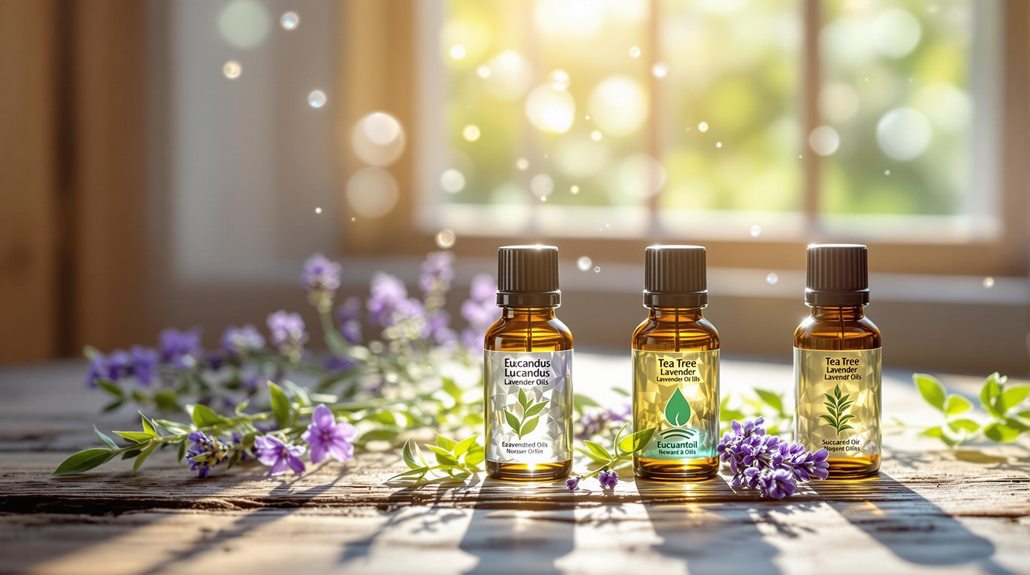
While makeup removers work well, natural oils offer a gentler approach to eliminating unwanted perfume. You'll find that almond, jojoba, and grape seed oil are particularly effective at breaking down fragrance compounds while nourishing your skin. These natural oils work as a dual-purpose solution, providing both perfume removal and a luxurious beauty treatment.
To effectively remove perfume using natural oils, follow these simple steps:
- Apply your chosen oil (almond, jojoba, or grape seed oil) directly to the areas with unwanted perfume
- Massage the oil into your skin using gentle, circular motions
- Use a dry body brush or sponge to work the oil deeper into your skin, helping to lift the fragrance
After completing these steps, rinse your skin with your regular shower gel. You'll notice that not only is the unwanted perfume gone, but your skin feels incredibly soft and silky. For best results, finish by applying your favorite lotion or another layer of natural oil. This method is particularly beneficial because it avoids harsh chemicals while providing deep moisturization, making it an ideal solution for those with sensitive skin.
Soap and Water Techniques
Three basic soap and water techniques stand out as the most reliable methods for removing unwanted perfume from your skin. The first and simplest approach involves using plain white soap with warm to hot water, which naturally breaks down and lifts the fragrance molecules from your skin's surface. You'll want to create a rich lather and apply it directly to the scented areas.
For a more thorough cleanse, try the washcloth method. Dampen a clean cloth with hot water, add your regular soap, and gently scrub the perfumed areas in circular motions. This mechanical action helps lift stubborn fragrance compounds that might be clinging to your skin. Think of it as a mini version of what your washing machine does with clothes - agitation plus soap equals better cleaning.
The most effective technique combines baking soda with your regular soap to create a powerful deodorizing paste. Mix a small amount of baking soda with your soap and warm water, then apply it to the scented areas. After washing, make sure to rinse thoroughly and pat your skin dry with a clean towel to avoid redistributing any remaining fragrance particles.
Vinegar and Baking Soda Applications
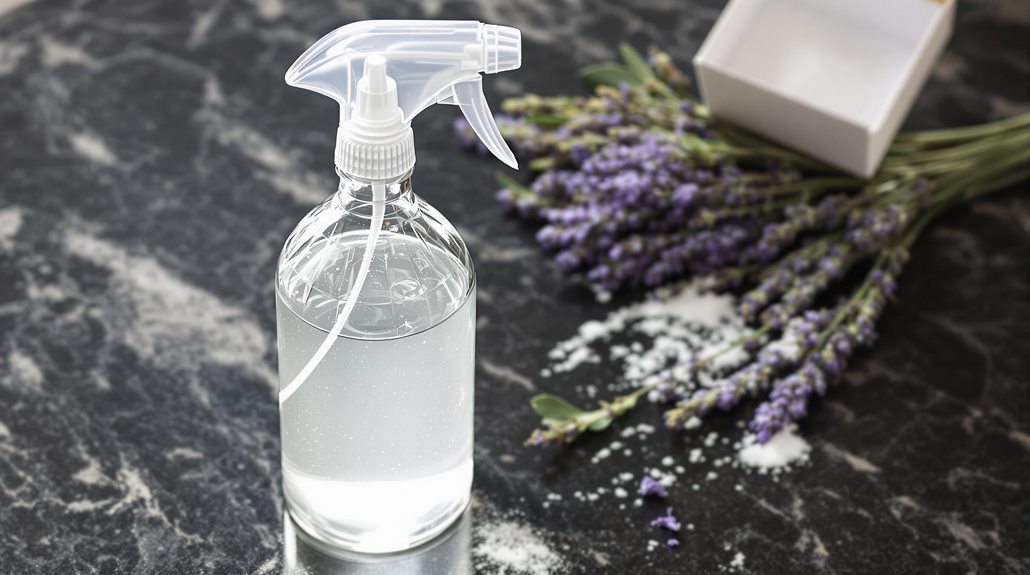
Building on these soap-based methods, vinegar and baking soda offer even more powerful solutions for stubborn perfume removal. When combined, these natural deodorizers create a potent cleaning solution that effectively breaks down fragrance molecules and eliminates unwanted odors.
To tackle persistent perfume smells, you'll find success with these targeted applications:
- Create a baking soda paste by mixing it with water, apply it to perfumed areas, let it dry completely, and vacuum it up to absorb lingering scents
- Spray white vinegar directly onto affected surfaces, or soak fabrics in a vinegar solution to neutralize strong perfume odors
- For hair and scalp treatment, use a diluted vinegar rinse to remove stubborn perfume residue
For maximum effectiveness, you can sprinkle baking soda on carpets and upholstery, allowing it to sit overnight before vacuuming. This method works particularly well for porous materials that tend to trap fragrances. Don't worry about the vinegar smell - it dissipates quickly, taking the perfume scent with it. For particularly stubborn cases, you can repeat these treatments until you achieve the desired results.
Fabric Treatment Strategies
Targeting different fabric types requires specific treatment approaches, since natural and synthetic materials interact with perfume molecules in distinct ways. If you're dealing with natural fibers like cotton or wool, you'll need to be especially thorough, as these materials can hold up to 85% more Eau de Toilette and other fragrances than synthetic fabrics.
For natural fabrics, start by hanging your clothes outside to air them out, as fresh air works well to dissipate trapped scents. You can also place activated charcoal briquettes near your stored clothing, as they'll naturally absorb lingering perfume molecules. For synthetic materials like polyester, which are less absorbent, a simple wash with enzyme-based detergent should do the trick.
When washing any perfume-scented garments, skip the fabric softener as it can trap unwanted odors. Instead, add white vinegar during the rinse cycle to neutralize persistent scents. After washing, line-dry your clothes rather than using a dryer - this allows remaining fragrance molecules to evaporate naturally. For stubborn cases, pre-treat fabrics with a baking soda paste before washing to help break down the scent compounds.
Quick Fixes for Skin
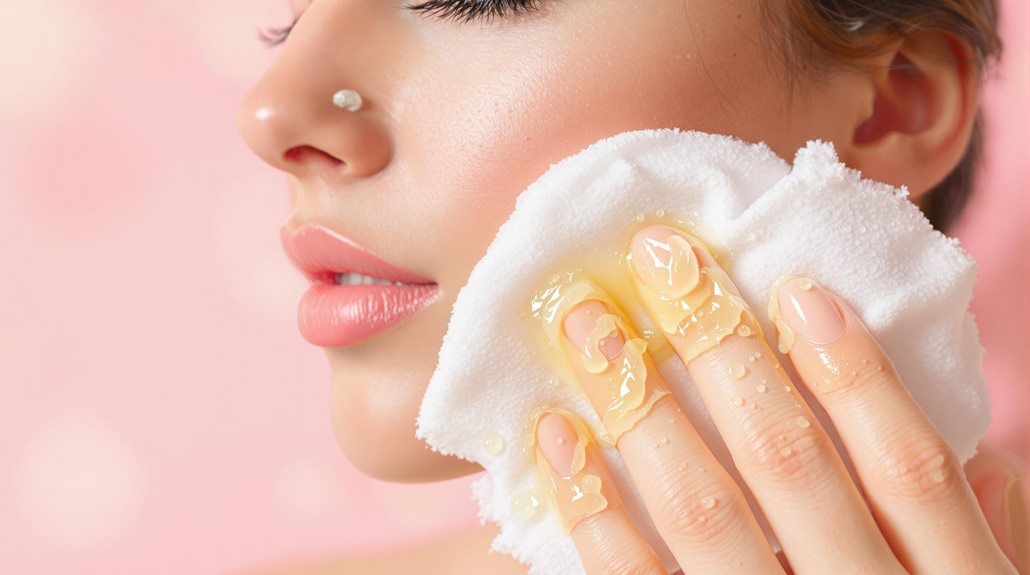
When perfume lingers on your skin longer than desired, several household items can come to the rescue. While you might be tempted to reach for air freshener or create a vinegar rinse in a spray bottle, there are more effective solutions specifically for skin contact.
Your makeup bag holds one of the best solutions - waterproof makeup remover. Simply saturate a cotton pad and gently wipe the affected area. If you don't have makeup remover handy, natural oils like almond, jojoba, or grape seed can work just as effectively when massaged into your skin.
For particularly stubborn scents, try these proven methods:
- Apply a small amount of toothpaste using a soft-bristled toothbrush, gently scrubbing the area where the perfume was applied
- Use antibacterial hand gel or rubbing alcohol on a cotton pad to lift away the unwanted fragrance
- Layer a moisturizing balm with woody or herbal notes to help neutralize the offensive scent
These solutions are gentler on your skin than harsh alternatives and work quickly to eliminate unwanted fragrances. Remember to test any new solution on a small area first to ascertain you don't have any sensitivities.
Chemical-Based Removal Options
For persistent perfume odors that resist natural solutions, chemical-based removal options provide powerful and targeted elimination. Enzyme-based detergents work really well by breaking down perfume molecules at their core, effectively dismantling the scent structure that's causing the problem. Even though dish soap might seem like a simple solution, specialized odor removers are specifically formulated to penetrate deep into fabric fibers and remove the chemical compounds that create unwanted fragrances.
Before using any chemical treatment, you'll want to check your garment's care label to prevent damage. For maximum effectiveness, combine your chosen chemical solution with a cup of white vinegar during the rinse cycle. This combination helps neutralize remaining scent molecules while ensuring no chemical residue stays behind. For particularly stubborn cases, activated charcoal-based products offer exceptional odor absorption capabilities, trapping perfume molecules within their porous structure. You can find these specialized products in most grocery stores or online retailers. When using chemical removers, always follow the manufacturer's instructions carefully to achieve the most effective results without compromising your fabric's integrity.
Hair Deodorizing Solutions
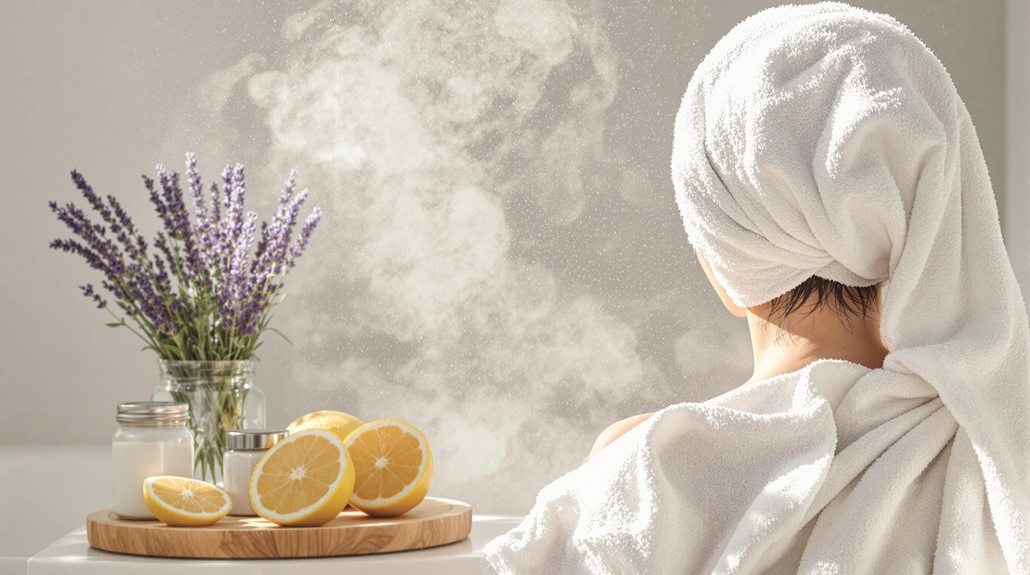
Several effective solutions can help you remove unwanted perfume smells from your hair without causing damage. When you're dealing with persistent odor coming from your hair, natural remedies often work best to remove fragrance molecules effectively. A vinegar rinse can break down the unwanted scents, while a baking soda paste used to remove stubborn fragrances works by absorbing the offending molecules.
For best results, try these proven methods:
- Apply a mixture of apple cider vinegar and water to your hair, letting it sit for 5 minutes before rinsing thoroughly
- Create a paste using baking soda and water, massage it into your scalp, then rinse completely
- Work a few drops of unscented almond or jojoba oil through your hair to lift away persistent perfume molecules
For quick fixes between washes, dry shampoo can absorb excess fragrance when sprinkled at the roots and brushed through. If you're dealing with particularly stubborn scents, opt for a clarifying shampoo or one containing activated charcoal. Unlike air purifiers that only clean the surrounding environment, these solutions directly target the perfume molecules trapped in your hair.
Prevention and Best Practices
While treating existing perfume odors is helpful, preventing them from becoming a problem in the first place can save you time and effort. Start by choosing natural fabrics like cotton and linen for your wardrobe, as they're less likely to trap scent molecules compared to synthetic materials. When applying perfume, use proper techniques such as spraying on pulse points or the walk-through method, which can substantially reduce fabric transfer.
For your closet maintenance, it's a good idea to place scented sachets or bowls of baking soda to neutralize any lingering fragrances. Before getting rid of perfume smell from your clothes, always check the care label to guarantee you're using appropriate cleaning methods. When washing affected items, add a cup of white vinegar to the rinse cycle - it's a natural deodorizer that won't leave behind any unwanted scents.
If you do need to wash perfume-scented clothes, use cold water to prevent the scent molecules from becoming more embedded in the fabric. By following these preventive measures and best practices, you'll maintain fresher-smelling clothes and spend less time dealing with unwanted perfume odors.
Conclusion
Whether you're dealing with unwanted fragrance on your skin, clothes, or in your space, you've got multiple effective options at your fingertips. From natural remedies like vinegar and oils to chemical-based solutions, you'll find what works best for your situation. Remember to test any new removal method on a small area first, and you'll be back to a neutral scent in no time.

